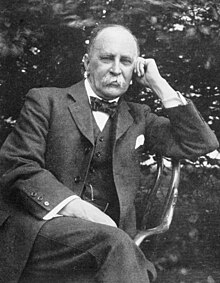Osler House
|
Sir William Osler Bt FRS FRCP |
|
|---|---|

Osler, c. 1912
|
|
| Born |
July 12, 1849 Bond Head, Canada West |
| Died | December 29, 1919 (aged 70) Oxford, England, UK |
| Residence | Canada United Kingdom |
| Nationality | Canadian |
| Alma mater | McGill University |
| Scientific career | |
| Fields | physician, pathologist, internist, educator, bibliophile, author and historian |
| Institutions | McGill University, Johns Hopkins School of Medicine, Johns Hopkins Hospital, University of Pennsylvania, University of Oxford |
| Signature | |
 |
|
Sir William Osler, 1st Baronet, FRS FRCP (/ˈɒz.lər/; July 12, 1849 – December 29, 1919) was a Canadian physician and one of the four founding professors of Johns Hopkins Hospital. Osler created the first residency program for specialty training of physicians, and he was the first to bring medical students out of the lecture hall for bedside clinical training. He has frequently been described as the "Father of Modern Medicine" and one of the "greatest diagnosticians ever to wield a stethoscope". Osler was a person of many interests, who in addition to being a physician, was a bibliophile, historian, author, and renowned practical joker. One of his achievements was the founding of the History of Medicine Society (previously section) of the Royal Society of Medicine, London.
William's great-grandfather, Edward Osler, was variously described as either a merchant seaman or a pirate. One of William's uncles (), a medical officer in the Royal Navy, wrote the Life of Lord Exmouth and the poem The Voyage. (Osler, Edward, 1798–1863. The Voyage : a poem, written at sea, and in the West Indies, and illustrated by papers on natural history. London : Longman, 1830). William Osler's father, Featherstone Lake Osler (1805–1895), the son of a shipowner at Falmouth, Cornwall, was a former Lieutenant in the Royal Navy who served on HMS Victory. In 1831 Featherstone Osler was invited to serve on HMS Beagle as the science officer on Charles Darwin's historic voyage to the Galápagos Islands, but he turned it down because his father was dying. In 1833, Featherstone Osler announced he wanted to become a minister of the Church of England.
...
Wikipedia
